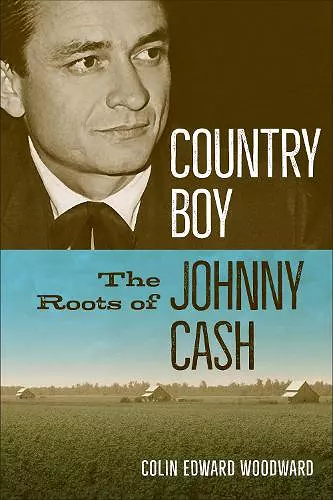Country Boy
The Roots of Johnny Cash
Format:Paperback
Publisher:University of Arkansas Press
Published:20th Jul '22
Should be back in stock very soon

Because Johnny Cash cut his classic singles at Sun Records in Memphis and reigned for years as country royalty from his Nashville-area mansion, people tend to associate the Man in Black with Tennessee. But some of Cash’s best songs—including classics like “Pickin’ Time,” “Big River,” and “Five Feet High and Rising”—sprang from his youth in the sweltering cotton fields of Mississippi County in northeastern Arkansas.
In Country Boy, Colin Woodward combines biography, history, and music criticism to illustrate how Cash’s experiences in Arkansas shaped his life and work. The grip of the Great Depression on Arkansas’s small farmers, the comforts and tragedies of family, and a bedrock of faith all lent his music the power and authenticity that so appealed to millions. Though Cash left Arkansas as an eighteen-year-old, he often returned to his home state, playing some of his most memorable and personal concerts on his native soil, where, to use Cash’s phrase, he could touch his roots again. Drawing upon the country legend’s songs and writings, as well as the accounts of family, fellow musicians, and chroniclers, Woodward reveals how the profound sincerity and empathy so central to Cash’s music depended on his maintaining a deep connection to his native Arkansas—a place that never left his soul.
“Johnny Cash comes alive in Arkansas, and it in him. Though his fabulous career took him far afield, as Colin Woodward tells us in this important book, all roads led back to the piney woods and gumbo soil of his fateful home state.”—Michael Streissguth, Johnny Cash: The Biography
“Country Boy is a welcome addition to all things Cash, focusing directly on his home state of Arkansas and the influence it had on shaping his values and nurturing his creativity. Colin Woodward peels away myths and legends, including some perpetuated by Cash himself, and replaces them with facts and absorbing scenarios of how the fictions came about.”—Ruth Hawkins, Emeritus director, Arkansas State University Heritage Sites, and founding director, Johnny Cash Boyhood Home.
“Colin Woodward has scraped away any romanticism that might obscure the reality of Cash’s roots: the hardscrabble existence along with nobility, faith, and the best of the human condition. We know where Johnny Cash ended up. This inspiring book tells us how he got there.”—Mark Stielper, music historian
“It would be hard to overstate the role of Johnny Cash’s Arkansas upbringing, through Depression and wartime, in shaping the artist and citizen he later became. Country Boy puts Cash in proper historical and geographic context in this vital contribution to our understanding of the Man in Black.”—Michael Stewart Foley, author of Citizen Cash: The Political Life and Times of Johnny Cash
“In Country Boy: The Roots of Johnny Cash, Colin Edward Woodward argues that the connection between Cash and his native Arkansas deserves far more scholarly attention than it has received in the past. He contends that Arkansas germinated the seed of Cash’s genius and served as a lifelong anchor as he navigated the twists and turns of an iconic career. … Woodward grounds Cash firmly within scholarly sources and wider historical contexts, focusing on Cash’s humanity, his failures and successes as a husband and father, his drug abuse, and his important contributions to prison reform and Native American social justice. Throughout, Woodward keeps Cash grounded as he surveys the artist’s recording career in Memphis, his move to California, and his life on the outskirts of Nashville. Woodward’s musical analysis is particularly strong throughout the book. … The book is accessible and well-researched, and a welcome addition to southern history. Woodward’s command of Cash historiography is clear, and his careful use of contemporary newspaper coverage, family remembrances, and Cash’s own words renders a compelling argument worthy of recommendation.”—Brian Dempsey, Journal of Southern History, August 2023
ISBN: 9781682262085
Dimensions: 226mm x 151mm x 25mm
Weight: 254g
348 pages